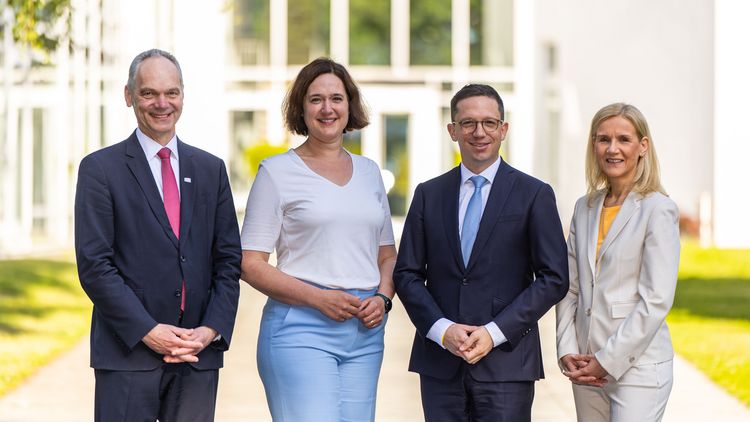The universities of Bremen and Oldenburg want to move into the future as a University Excellence Consortium. The two universities submitted their letter of intent to the German Science and Humanities Council (Wissenschaftsrat, WR) today, meeting the deadline. This marks the next important step on the path to receiving funding under the federal and state governments' Excellence Strategy. The proposal must now be prepared and submitted by November 12. If successful, Bremen and Oldenburg will receive funding of between 15 and 28 million Euros per year starting in 2027. The decision will be made in October next year. To be eligible to apply for funding as a University Excellence Consortium, the consortium must have at least three approved Clusters of Excellence; the universities of Oldenburg and Bremen received approval for a total of four clusters on May 22.
"The universities in Oldenburg and Bremen impressed with their great achievements in the selection of Clusters of Excellence. Their respective areas of focus complement each other perfectly. The two universities have been working closely together for decades, and this cooperation now plays a key role in shaping the academic identity of both locations. I am very pleased about the planned pooling of these competencies in the northwest. Together with the MHH and Leibniz University Hannover, Lower Saxony has three strong applicants in the running – with fantastic chances of being awarded the title of University of Excellence," explained Lower Saxony's Minister of Science Falko Mohrs.
Supported by both federal states
On June 21, Minister Mohrs and Kathrin Moosdorf, Senator for the Environment, Climate, and Science of the Free Hanseatic City of Bremen, met with the university management teams and cluster of excellence spokespersons from the universities of Oldenburg and Bremen at the HWK Institute for Advanced Study in Delmenhorst. In this context, the minister and the senator gave a written statement assuring that both federal states would give their full support to the University Excellence Consortium.
"We are breaking new ground with this cross-state proposal. The two universities have a lot in common and have been working together closely and in a spirit of trust for many years. They now have many innovative research assets to offer and have even been awarded four clusters in the Excellence Strategy competition. That is extremely impressive. Both Minister Mohrs and I will support the universities with all our might and eagerly await the decision in fall 2026," said Moosdorf.
There was never any doubt that the two universities would enter the competition for one of the 15 future University of Excellence locations in Germany as a consortium rather than individually. “We are actively and effectively developing our long-standing and trusting cooperation,” emphasized Prof. Dr. Ralph Bruder, President of the University of Oldenburg. “The best example of this is the Northwest Alliance, with which we established a joint research and transfer space in and for the Northwest region at the beginning of the year.” This also includes the University of Groningen as a privileged partner with which both universities maintain close ties. “With our proposal as a University Excellence Consortium, we will not only be connecting two federal states, but also two countries,” said Bruder.
"We are two young, unconventional, and reform-oriented universities that are breaking new ground together in the Northwest. In periods of global challenges, we want to promote excellent research with social responsibility. In the Northwest, we have a very powerful research infrastructure that is often underestimated. With our joint proposal from Bremen and Oldenburg, we want to send a clear signal for our region and are working closely with the HWK Institute for Advanced Study and numerous non-university research institutes," stated Prof. Dr. Jutta Günther, President of the University of Bremen. “Our response to a world in flux is cooperation and cohesion!”
Excellence Strategy of the Federal and State Governments
The decision on the funding of 70 Clusters of Excellence across Germany was made on May 22. Starting on January 1, 2026, a total of four Clusters of Excellence will be funded for seven years at the universities of Bremen and Oldenburg: Hearing4all.connects (hearing research / University of Oldenburg, MHH, and University of Hannover), The Martian Mindset (materials and production research / University of Bremen), NaviSense (animal navigation research / University of Oldenburg), and The Ocean Floor (marine research / University of Bremen and University of Oldenburg).
In addition to the Clusters of Excellence, the Universities of Excellence form the second line of funding under the Excellence Strategy. Universities and consortia that can demonstrate a convincing overall strategy for improving their position in the regional, national, and, in particular, international environment have a good chance of being awarded the status of University of Excellence or University Excellence Consortium. This applies not only to research, but also to teaching, transfer, and research infrastructures.
The federal and state governments are providing a total of 208 million Euros annually for the upcoming funding phase of the Universities of Excellence and University Excellence Consortia. The increase of 60 million Euros compared to the current funding phase will make it possible to support up to 15 locations starting in 2027, instead of the previous 11.




